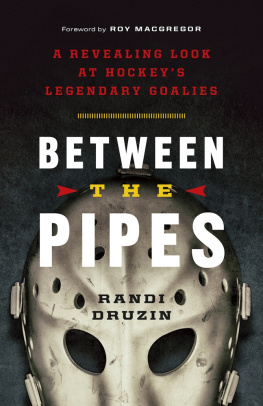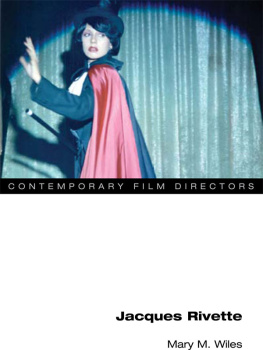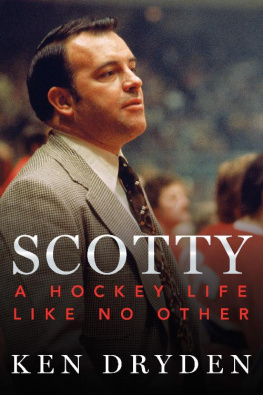To my mother, my brother, and my father who back in the day was also a guardian of the goal who quite often found himself staring down an approaching puck without the benefit of a mask
In his time, Jacques Plante was called a lot of things, not all of them complimentary. Iconoclastic? Yes. Hypochondriacal? At times. Idiosyncratic? Yes. Superstitious? Definitely. But, above all, Frre Jacques was a unique individual, a marvelous teacher, ahead of his time, and the man who quite literally changed the very face of hockey.
NEW YORK TIMES, MARCH 16, 1986
There are a lot of very good goalies; there are even a fair number of great goalies. But there arent many important goalies. And Jacques Plante was an important goalie.
KEN DRYDEN
Jacques Plantes impact on the game is forever.
JACK FALLA
FOREWORD
By Jean Bliveau
In the fall of 1948, I began playing in the Quebec Junior A Hockey League as a member of my hometown Victoriaville Tigers. We were an expansion outfit and were primarily made up of the other teams extra players. Despite all of this we were playing close to .500 hockey through the fall as we got set to face off with the first-place Quebec Citadels on November 25.
I didnt know it at the time but that night would prove to be auspicious for two reasons: It was my first visit to the Quebec Colise where in the next few seasons I would enjoy some of my greatest successes, initially with the Citadels and later with the Quebec Aces. And it was also the first time I met and shared the ice with Jacques Plante.
By then, Jacques had already garnered a considerable amount of attention for his wandering ways and his habit of charging out of his net to play loose pucks, frustrating the attacking forwards. I was very fortunate that evening to score two goals on Jacques, including one where I beat him to a loose puck and then tucked it into the open net. Years later I would tease Jacques about my open-net goal that night at the Colise.
In the fall of 1953, I joined the Montreal Canadiens, playing alongside many of those talented players whose exploits I had closely followed while listening to my familys radio only a few short years before: Maurice Richard, Elmer Lach, and Butch Bouchard. That first year, I tried to learn as much as I could from my new teammates, about what it took to be a professional hockey player and how one should represent the Montreal Canadiens. I wasnt the only new player with the team that season. Players like Dickie Moore, Bernie Geoffrion, and Doug Harvey had established themselves, and Jacques Plante was into his first year as the teams starting goaltender after helping the Canadiens to a Stanley Cup in 1953, and a repeat appearance in the finals the spring before.
Jacques took his position very seriously. He approached his profession with a scientific precision and was always looking to better his game. Jacques was a fast, smooth, and agile skater, and used these skills to revolutionize the game. He was able to do things in the net that other goalies couldnt match. He would stay back in his goal until the last possible moment before striking out to quickly poke-check the puck away from an onrushing forward. He also possessed a quick glove hand and an aptitude for finding the perfect position to face a shooter.
In my third year with the team, Toe Blake became the Canadiens head coach. One of the more critical adjustments that Toe made to our team was implementing an attacking style that became famously known as firewagon hockey. We could afford to play such a style because of our talented forwards and quick-thinking defencemen and because we had Jacques Plante in our net.
There were times that we found ourselves caught in the wrong end as the other team rushed towards our goal with the puck. It would be up to Jacques to bail us out, and more often than not he would succeed. On nights that our team got off to a sluggish start, and even when the opposition was out-shooting us, the period would often end in a scoreless tie. Jacques would hold the fort until we got our footing and could come back to win the game. With Jacques Plante in the net we were always in the game.
He was certainly responsible for many of our Stanley Cups. The players on the team that won five consecutive championships all shared a dedication to their responsibilities. Each of us had a specific role to play on that team and Jacques did his as well as anybody. We all shared a passion for winning and a disdain for losing. In hockey, without a really good goalie youre in trouble. As a team we respected Jacques because we knew we had a great goalie backing us up. On the other hand, when a goalie makes a mistake there is nobody to back him up. Jacques accepted that responsibility and thrived on the pressure.
In addition to his play on the ice, Jacques received a lot of attention for what he did off the ice. Like many goaltenders, Jacques tended to be a solitary sort, and he spent his spare moments in a dressing room or on the train knitting. Some of the practical jokers on the team were tempted to bug Jacques about his pastime, but I always tried to dissuade them. I would remind them that Jacques was doing the job in the nets and helping the team win and urged them just to let him be. Luckily for us, they almost always did.
Back in those days we spent a lot of time travelling from city to city by train. Sometimes I would take the seat beside him and the two of us would talk for hours, and not just about hockey, but about family, life, and the future. These are my fondest memories of Jacques.
There has not been a goalie since Jacques Plante with the same talent and determination. He will always be Mr. Goalie to me.
PROLOGUE
IN THE DAYS BEFORE flight became the preferred mode of travel, players spent interminable amounts of time anchored within a little cocoon. In a league made up of only six teams there was no such thing as a short train trip. Often the team would get off the train, head straight to the arena, play the game, and rush back to the station in an effort to get to the next city in time for the next game. A trip from Montreal to Toronto took five hours on average, Montreal to Detroit nine hours, and the worst and the longest of them all: the twenty hours that separated Montreal and Chicago.
There wasnt much for the players to do on those train rides. For the majority, endless games of cards in small groups made time go a little bit faster while helping many feed their competitive instincts. Others attempted to sleep the ride away; some played pranks on unsuspecting victims.
Jacques Plante didnt play cards or sleep much or play pranks. When not immersed in a book or knitting, Plante generally passed the time with his fellow passengers, discussing the one subject that each of them knew most intimately the game of hockey. When Plante discussed the game it was always in the most serious of tones, well thought out, well reasoned. Almost without exception, what made his point stand out was its pragmatism.
In the early months of 1963, on the way to another city, one discussion transcended the boundaries of that train and erupted into a league-wide scandal that dominated the headlines.
When he spoke, Jacques Plante always gathered a crowd. A veteran of the National Hockey League wars for a decade, Plante was the circuits most decorated goaltender. Winner of six Stanley Cups and five Vezina trophies as the leagues top goaltender (a sixth Vezina would follow in a few months time), he also was also the sports greatest innovator, its most outspoken superstar, and a true eccentric who marched to the beat of his own drum. In other words, he was a reporters dream. So when the media caught wind of a heated discussion between Plante and Ken Reardon, the Canadiens vice-president, they immediately scrambled to listen in.












